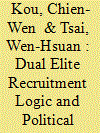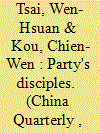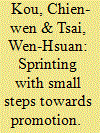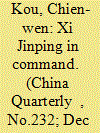| Srl | Item |
| 1 |
ID:
183633


|
|
|
|
|
| Summary/Abstract |
Under Xi Jinping, the cadre recruitment policy of the Chinese Communist Party (CCP) has been adapted. What are the political implications of these adaptations? This paper argues that Xi has sought to consolidate his power among the political elite and strengthen grassroots governance by introducing a new cadre recruitment policy. We propose the concept of “dual elite recruitment logic” as an aid to interpreting the cadre recruitment strategy in the Xi era: the CCP’s system for appointing and promoting cadres at the full provincial/ministerial level (正部级 zhengbuji) and the grassroots follows’ criteria that are different from those formulated under the previous “rejuvenation of cadres” principle. While China under Xi may be able to maintain political stability and promote socio-economic development in the short term, the lack of a new succession mechanism is the biggest obstacle to China’s future political development.
|
|
|
|
|
|
|
|
|
|
|
|
|
|
|
|
| 2 |
ID:
139543


|
|
|
|
|
| Summary/Abstract |
This article discusses the origin and consolidation of the Chinese Communist Party (CCP) reserve cadre system and considers its impact on the resilience and perpetuation of the Party's authoritarian regime. Reserve cadres are essentially the Party's “disciples”; through careful selection and training, the CCP is able to build a legion of youthful political elites with exceptional administrative ability and correct political thinking. Upon assumption of Party and government posts, these reserve cadres are able to reinforce the Party's autonomy and resist outside pressures to democratize, thereby manifesting the very nature of a resilient authoritarian regime.
|
|
|
|
|
|
|
|
|
|
|
|
|
|
|
|
| 3 |
ID:
130447


|
|
|
|
|
| Publication |
2014.
|
| Summary/Abstract |
Within the operational procedures of the Chinese Communist Party (CCP) cadre appointment system, age restrictions hinder cadre promotion. As a result, three different methods have emerged to bypass these restrictions, allowing officials to attain faster promotion. These three methods are the Communist Youth League route, temporary transferred duty and non-regulation promotion. This article will explain the age restriction system, and then outline the three methods and discuss their impact on the appointment system as a whole. The examples of Zhou Qiang and Lu Hao, rising political stars, demonstrate how these methods are used to gain substantial age advantages for successful career progression.
|
|
|
|
|
|
|
|
|
|
|
|
|
|
|
|
| 4 |
ID:
156602


|
|
|
|
|
| Summary/Abstract |
The PLA has been a key player in Chinese elite politics since 1949. However, a series of developments over the last four years has prompted China watchers to re-evaluate Party–military relations. This paper argues that CCP–PLA relations in the Xi Jinping era are characterized by the centralization of power in a single civilian individual. This centralization is reflected by events such as a new emphasis on the CMC chairman responsibility system, the establishment of new coordination bodies under the top leader, radical reforms to the military command structure, the promotion of Xi's public image as the top leader, and large-scale personnel reshuffes during which Xi's trustees have gradually come to occupy key military posts while his rivals have been removed. For Xi, these measures are an antidote to the principal–agent problem in CCP–PLA relations caused by both information asymmetry and the discrepant interests of civilian leaders and the top brass of the PLA.
|
|
|
|
|
|
|
|
|
|
|
|
|
|
|
|